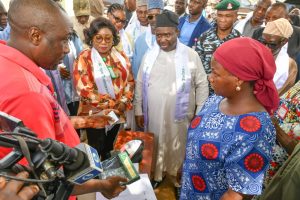Abuja – Nigeria’s independent electoral body is confidently asserting that the use of new technology has successfully eliminated identity theft and multiple voting from the country’s electoral process.
The Independent National Electoral Commission (INEC) is “beating its chest” over the performance of the Bimodal Voter Accreditation System (BVAS) deployed during the November 8 governorship election in Anambra State.
Speaking at the 2025 Digital Nigeria International Conference in Abuja, INEC Chairman Professor Joash Amupitan, represented by National Commissioner May Agbamuche-Mbu, declared that the era of the “ghost voter” is over.

BVAS and IReV Success
Professor Amupitan highlighted the significant results recorded during the Anambra polls:
- BVAS Performance: The 6,879 BVAS devices deployed achieved “highly commendable performance.”
- Result Transparency: Over 99 per cent of polling unit results were successfully uploaded to the INEC Result Viewing (IReV) portal on election day, offering near real-time transparency.
“The BVAS device has become our frontline defence against identity fraud, ensuring that only the rightful, eligible voter can be accredited at the polling unit,” Amupitan stated. “With the biometric safeguards now in place, voter impersonation has been effectively eliminated from our electoral system.”
He insisted that these outcomes confirm that the deployment of BVAS and IReV is no longer experimental but “an entrenched part of Nigeria’s electoral architecture.”
No U-Turn on Technology
Despite lingering technological challenges, the INEC Chairman sent a firm message to the political class, shutting the door on any suggestion of returning to manual procedures. He described the old system of manual accreditation as “vulnerable to human interference.”
“The gains we have recorded are too significant to reverse,” Amupitan insisted, outlining plans to actively upgrade the current technology for future, more seamless solutions.
He attributed the legal backing for this commitment to the Electoral Act 2022, which transformed digital devices from mere administrative guidelines into “statutorily protected pillars” of the electoral system.
Remaining Challenges
While celebrating the success in tackling voter impersonation, the INEC acknowledged that significant logistical hurdles remain, primarily concerning internet connectivity.
Professor Amupitan admitted that the nation’s uneven telecommunications landscape is a “stubborn obstacle.” With 176,846 polling units located in remote and difficult-to-access communities, achieving real-time upload of results to the IReV portal remains a major transparency battle.
“A tool like the BVAS is only as good as the network it runs on,” he noted. The Commission plans to continue engaging with the Nigerian Communications Commission (NCC) and network providers while actively exploring alternative technologies to bridge the connectivity gaps.





Add Comment